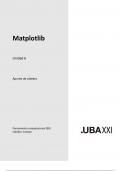Case
Matplotlib con Phyton
- Course
- Institution
Matplotlib es una biblioteca de visualización en Python que permite crear gráficos estáticos, animados e interactivos. Es muy utilizada para generar gráficos en 2D y 3D, como líneas, barras, histogramas, dispersión, entre otros. Características Clave: Gráficos de líneas: Crear gráfi...
[Show more]



